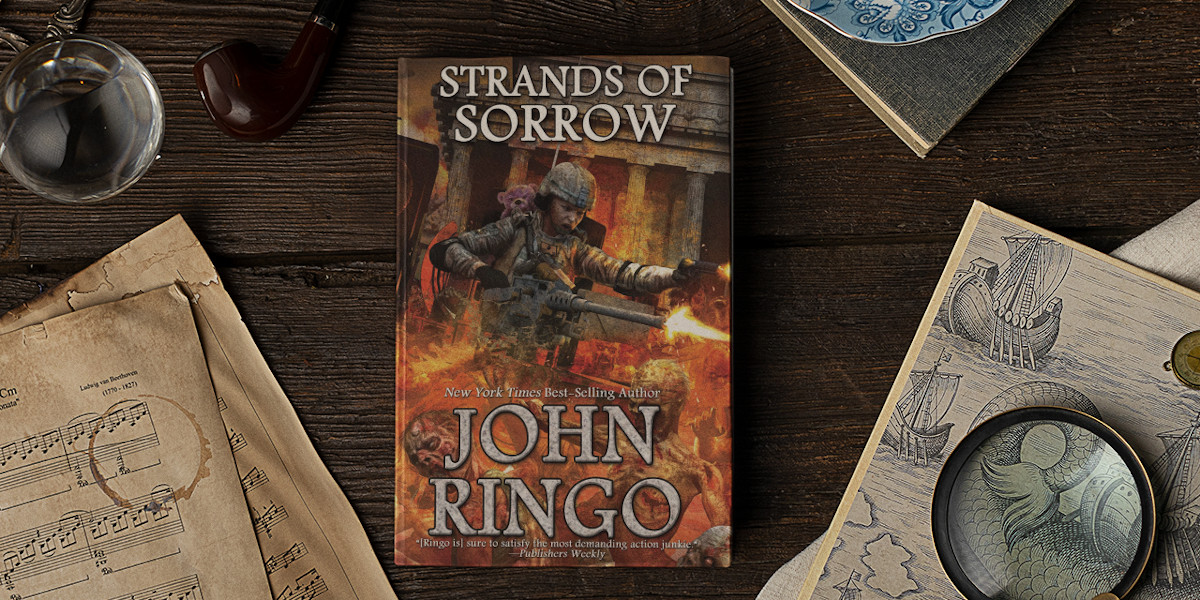"Black Tide Rising" Series Blends Prepper Philosophy With Horror Fantasy
Delivers Humor-Filled, Cerebral Take On Zombie Killing

In the introduction to "Strands of Sorrow", the fourth installment in the "Black Tide Rising" series of swashbuckling, post-apocalyptic novels by John Ringo, the author writes, "I'd really hoped I was finished with the main story of the Black Tide universe with book three: "Islands of Rage and Hope"." Fortunately, Ringo decided that he wasn't finished at all. After writing the first four volumes of the series on his own, Ringo has collaborated on and/or authorized six more volumes by other authors. "Strands of Sorrow", the author's last solo installment, is a deeply satisfying addition to the series, full of the witty-but-testosterone-laden humor and smart-but-badass, zombie-clobbering action that is the author's hallmark.
At first glance, the series appears to be a conventional, "zombie apocalypse" narrative. But, as somebody once suggested, don't judge a book by its cover (especially the lurid and somewhat misleading covers of these books). Ringo spins a yarn with more wit, intelligence and originality than an M-ATV load of mainstream zombie novels. (An M-ATV, by the way, is a Mine-Resistant, Ambush-Protected, All-terrain Vehicle" - just one of the many tidbits of military trivia with which the author, a veteran of the 82nd Airborne, peppers his stories.) While the archetypal zombie story involves eating brains, Ringo's characters prefer to "use" theirs. Faced, in book one: "Under A Graveyard Sky", with an airborne virus that turns the infected into violent, mindless, naked "zombies," they don't take the normal approach of roaming the countryside trying not to get eaten, they take to the high seas in maritime vessels, rescuing survivors and salvaging resources that allow them not only to fight back, but to start producing a vaccine and to rebuild society. By book four: "Strands of Sorrow", that mission is well underway.
Unlike, say, "The Walking Dead", the Black Tide novels are long on adventure and short on tragic drama. Stylistically, the books have more in common with the hard-boiled detective stories of the 1940s than the grim nihilism that characterizes so much of contemporary entertainment. While death and destruction are the ever-present companions of the books' protagonists, the author's tone is light, and his touch is deft. As an Iraq war veteran, Ringo knows first-hand how people in mortal danger use humor to cope with their circumstances, and that gallows humor runs deep in "Strands of Sorrow". Moreover, Ringo does not ascribe to George R. R. Martin's school of making the reader care deeply about a large number of characters and then suddenly killing them all off. Nor, thankfully, does he adopt the trend, most inexplicably popularized by the "Divergent" series, of writing in the facile and irritating, "See Spot run" present-tense.
Indeed, in several ways, the Black Tide series is the opposite of today's most popular franchises. While the immensely popular "Hunger Games" and "Divergent" series explore the themes of rebellion against a controlling authority (in PG-rated prose), Ringo's Black Tide novels imagine a post-Plague world so dangerous and chaotic that the heroes' primary challenge is to establish and maintain a controlling authority. They rise to this challenge, of course, and they do so with a generous helping of R-rated dialogue and adult themes.
Like the rest of the Black Tide series, "Strands of Sorrow" revolves around the Smith family: Steve and Stacey Smith, and their teenage daughters Sophia and Faith. The Smith family's main hobbies appear to be prepping and competitive shooting, which serves them in good stead when persons unknown release a genetically-engineered virus in major population centers across the United States. After the first book, mom Stacey was relegated to the distant background, and in this installment, dad Steve moves to a supporting role as well. Here, Faith and Sophia - along with an offbeat cast of characters pulled from the wreckage of the broken world - are center stage. One of Ringo's premises is that, although stupid or lazy people were just as likely to survive the virus as anyone else, they were far less likely to survive the aftermath. "Strands of Sorrow" takes place approximately one year after the H7D3 virus was introduced, and by this time, only the most enterprising - and lucky - are still alive.
The H7D3 virus does not turn people into the walking dead, it shuts down all brain function aside the most basic, reptilian drives to hunt and mate. Yes, mate; the naked zombies of Ringo's imagination (naked because, otherwise, clothes would obstruct their bowel movements), not only eat their victims, they often rape them at the same time. In fact, despite the "wanton slaughter of infected" that one character in "Strands of Sorrow" objects to, it has been Ringo's treatment of sexual situations throughout the Black Tide series that has made readers most uncomfortable. From a USMC staff sergeant (one of the main "good guys") explaining to a female subordinate that she really should sexually service all four of the male Marines with whom she is trapped, to a multi-page discussion of how a teenage boy accidentally impregnated a 12-year old girl on a life raft, to the many leering descriptions of the "jailbait" (13-year old and 15-year old respectively) Smith daughters, Ringo's high-school-locker-room attitude towards sexuality has felt out of sync with his sophisticated approach towards every other aspect of the stories. In "To Sail A Darkling Sea" and "Islands of Rage and Hope", Ringo told us that women can be prodigy zombie-killers, helicopter pilots, military generals, and even Vice President, but they will also, when locked into a storage compartment with a group of men, cheerfully allow their bodies to be used for the amusement of anyone who expresses an interest. Fortunately, and perhaps because readers responded negatively to this dissonance, it is largely absent from "Strands of Sorrow."
The Black Tide books are paced almost like an episodic TV show, with every three or four chapters containing a self-contained story arc that also moves the overall plot forward. Although the big-picture storyline is fairly thin ("Strands of Sorrow" is billed as "The conclusion of the battle to reclaim civilization," but not only is civilization not reclaimed at its conclusion, we still don't have any idea who created the virus, or why it was launched), the reader never knows what's going to happen next, but Ringo makes sure that it will be something fun. He also makes sure that it's well-researched and plausible. From military humor to gun-geek discussions of the pros and cons of various rifle calibers, everything in the Black Tide world makes sense, and it's all based on real weapons, locations and military protocol. If you don't know what a "canister round" is, or what it would do fired into a mass of people, you'll find out in "Strands of Sorrow."
Dutch filmmaker Paul Verhoeven summarized the theme of his cult classic, "Starship Troopers," as "War makes fascists of us all." In the Black Tide rising series, war not only makes fascists of us, but gleeful mass-murderers. And, boy, is it fun! While "Starship Troopers," as imagined by Verhoeven from a fairly sincere novel by Robert A. Heinlein, was somewhat satirical, Ringo's Black Tide is an unabashed love letter to the US Armed Services. Its military characters are so cool, so badass, that the novels could easily act as a recruitment tool, especially for the Marine Corps, whose Devil Dogs occupy most of the limelight and soak up most of the glory in the series.
While Ringo doesn't explore every plot point - for example, the presence of nuclear reactors is mentioned, but there's no discussion of why they didn't all melt down once their operators succumbed to the Plague - he clearly makes an effort to address the many exigencies of a post-Plague world. To do so, he pulls from sociology, psychology, history, and science in a way that is unlike any other zombie-themed series. "Strands of Sorrow" is an excellent addition to a series that has already made an innovative and entertaining contribution to a well-worn genre. The Black Tide series is well-worth reading, and will be particularly enjoyed by readers with an affinity for dark humor and a curiosity about exactly what it would take to re-establish civilization in the wake of an extinction-level event.


